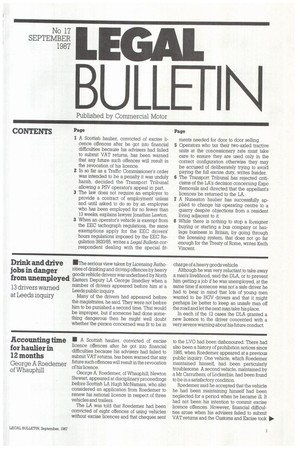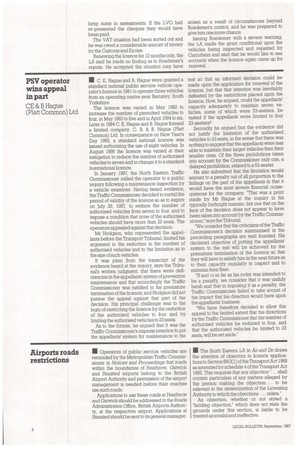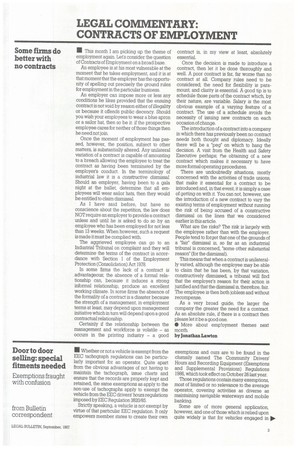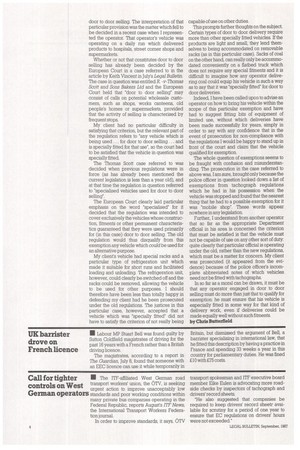LEGAL
Page 99

Page 100

Page 101

Page 102

If you've noticed an error in this article please click here to report it so we can fix it.
BULLETIN
1 A Scottish haulier, convicted of excise licence offences after he got into financial difficulties because his advisers had failed to submit VAT returns, has been warned that any future such offences will result in the revocation of his licence.
2 In so far as a Traffic Commissioner's order was intended to be a penalty it was unduly harsh, decided the Transport Tribunal allowing a PSV operator's appeal in part.
3 The law does not require an employer to provide a contract of employment unless and until asked to do so by an employee who has been employed for no fewer than 13 weeks, explains lawyer Jonathan Lawton.
3 When an operator's vehicle is exempt from the EEC tachograph regulations, the same exemptions apply for the EEC drivers' hours regulations imposed by the EEC Regulation 3820/85, writes a Legal Bulletin correspondent dealing with the special fit EThe serious view taken by Licensing Authorities of drinking and driving offences by heavy goods vehicle drivers was underlined by North Eastern Deputy LA George Smedley when a number of drivers appeared before him at a Leeds public inquiry.
Many of the drivers had appeared before the magistrates, he said. They were not before him to be punished a second time. That would be improper, but if someone had done something dangerous then he might well doubt whether the person concerned was fit to be in • A Scottish haulier, convicted of excise licence offences after he got into financial difficulties because his advisers had failed to submit VAT returns, has been warned that any future such offences will result in the revocation of his licence.
George A. Roedemer, of Whauphill, Newton Stewart, appeared at disciplinary proceedings before Scottish LA Hugh McNamara, who also considered an application from Roedemer to renew his national licence in respect of three vehicles and trailers.
The LA was told that Roedemer had been convicted of eight offences of using vehicles without excise licences and that cheques sent ments needed for door to door selling.
5 Operators who tax their two-aided tractive units at the concessionary rate must take care to ensure they are used only in the correct configuration otherwise they may be accused of deliberately trying to avoid paying the full excise duty, writes Insider.
6 The Transport Tribunal has rejected criticisms of the LA's decision concerning Expo Removals and directed that the appellants licences be returned to the LA.
7 A Nuneaton haulier has successfully applied to change his operating centre to a quarry despite objections from a resident living adjacent to it.
8 While there is nothing to stop a foreigner buying or starting a bus company or haulage business in Britain, by going through the licensing system, that does not go far enough for the Treaty of Rome, writes Keith Vincent, charge of a heavy goods vehicle.
Although he was very reluctant to take away a man's livelihood, said the DLA, or to prevent him getting a job if he was unemployed, at the same time if someone was not a safe driver he had to bear in mind that lots of young men wanted to be HGV drivers and that it might perhaps be better to keep an unsafe man off the road and let the next man lake his place.
In each of the 13 cases the DLA granted a new licence to the driver concerned with a very severe warning about his future conduct.
to the LVO had been dishonoured. There had also been a history of prohibition notices since 1985, when Roedemer appeared at a previous public inquiry. One vehicle, which Roedemer maintained himself, had been particularly troublesome. A second vehicle, maintained by a Mr Carruthers, of Lockerbie, had been found to be in a satisfactory condition.
Roedemer said he accepted that the vehicle he had been maintaining himself had been neglected for a period when he became ill. It had not been his intention to commit excise licence offences. However, financial difficulties arose when his advisers failed to submit VAT returns and the Customs and Excise took lump sums in assessments. If the LVO had re-presented the cheques they would have been paid.
The VAT situation had been sorted out and he was owed a considerable amount of money by the Customs and Excise.
Renewing the licence for 12 months only, the LA said he made no finding as to Roedemer's repute. He accepted the situation may have III C. E. Hague and B. Hague were granted a standard national public service vehicle operator's licence in 1981 to operate three vehicles from an operating centre near Barnsley, South Yorkshire.
The licence was varied in May 1982 to increase the number of permitted vehicles to four, in May 1983 to five and in April 1984 to six. Later in 1984 C. E. Hague and B. Hague formed a limited company, C. B. & B. Hague (Platt Common) Ltd. In consequence on New Years Day 1985, a standard national licence was issued authorising the use of eight vehicles. In August 1986 the licence was varied at their instigation to reduce the number of authorised vehicles to seven and to change it to a standard in iernational licence.
In January 1987, the North Eastern Traffic Commissioner called the operator to a public inquiry following a maintenance inspection by a vehicle examiner. Having heard evidence, the Traffic Commissioner decided to curtail the period of validity of the licence so as to expire on July 29, 1987, to reduce the number of authorised vehicles from seven to four, and to impose a condition that none of the authorised vehicles should have more than 23 seats. The operators appealed against that decision.
Mr Hodgson, who represented the appellants before the Transport Tribunal, limited his argument to the reduction in the number of authorised vehicles and to the limitation as to the size of such vehicles.
It was plain from the transcript of the evidence heard at the inquiry, says the Tribunal's written judgment, that there were deficiencies in the appellants' system of preventive maintenance and that accordingly the Traffic Commissioner was justified in his premature termination of the licence; and Hodgson did not pursue the appeal against that part of the decision His principal challenge was to the logic of restricting the licence by the reduction of the authorised vehicles to four and by limiting the authorised vehicles to 23 seats.
As to the former, he argued that it was the Traffic Commissioner's express intention to put the appellants' system for maintenance to the • Operators of public service vehicles are reminded by the Metropolitan Traffic Commissioner in Notices and Proceedings that roads within the boundaries of Heathrow, Gatwick and Stansted airports belong to the British Airport Authority and permission of the airport management is needed before their coaches use such roads.
Applications to use these roads at Heathrow and Gatwick should be addressed to the Roads Administration Office, British Airports Authority, at the respective airport. Applications at Stansted should be sent to its general manager. arisen as a result of circumstances beyond Roedemer's control, and he was prepared to give him one more chance.
Issuing Roedemer with a severe warning, the LA made the grant conditional upon the vehicles being inspected and repaired by Carruthers and said that he would like to see accounts when the licence again came up for renewal.
test so that an informed decision could be made upon the application for renewal of the licence, but that that intention was inevitably defeated by the restrictions placed upon the licence. How, he argued, could the appellants' capacity adequately to maintain seven vehicles, some of which were 53-seaters, be tested if the appellants were limited to four 23-seaters?
Secondly he argued that the evidence did not justify the limitation of the authorised vehicles to 23 seats, in the sense that there was nothing to suggest that the appellants were less able to maintain their larger vehicles than their smaller ones. Of the three prohibitions taken into account by the Commissioner only one, a delayed prohibition, related to a 53-seater.
He also submitted that the limitation would amount to a penalty out of all proportion to the failings on the part of the appellants in that it would have the most severe financial consequences for the company. "That was a point made by Mr Hague at the inquiry in his typically forthright manner; but one that on the face of the decision does not appear to have been taken into account by the Traffic Commissioner," says the Tribunal.
'We consider that the criticisms of the Traffic Commissioner's decision summansed in the preceding paragraphs are well founded His declared objective of putting the appellants' system to the test will be achieved by the premature termination of the licence so that they will have to satisfy him in the near future as to their capacity regularly to inspect and to maintain their fleet.
If and u so far as his order was intended to be a penalty, we consider that it was unduly harsh and that in imposing it as a penalty, the Traffic Commissioner failed to take accont of the impact that his direction would have upon the appellants' business.
"We have therefore decided to allow this appeal to the limited extent that the directions by the Traffic Commissioner that the number of authorised vehicles be reduced to four, and that the authorised vehicles be limited to 23 seats, will be set aside."
El The South Eastern LA in As and Ds draws the attention of objectors to licence applications to Section 690(1) of the Transport Act 1968 as amended by schedule 4 of the Transport Act 1982. This requires that any objection ". . shall contain particulars of any matters alleged by the person making the objection „ . to be relevant to the determination of the Licensing Authority to which the objections . . . relate."
An objection, whether or not styled a "holding objection," which does not state the grounds under this section, is liable to be treated as invalid and ineffective. • This month I am picking up the theme of employment again. Lets consider the question of Contracts of Employment on a broad base.
An employee is at his most vulnerable at the moment that he takes employment, and it is at that moment that the employer has the opportunity of spelling out precisely the ground rules for employment in the particular business.
An employer can impose more or less any conditions he likes provided that the ensuing contract is not void by reason either of illegality or because it offends public decency. Should you wish your employees to wear a blue apron or a sailor hat, then so be it if the prospective employee cares for neither of those things then he need not join.
Once the moment of employment has passed, however, the position, subject to other matters, is substantially altered. Any unilateral variation of a contract is capable of amounting to a breach allowing the employee to treat the contract as having been terminated by the employer's conduct. In the terminology of industrial law it is a constructive dismissal. Should an employer, having been to a gala night at the ballet, determine that all employees will wear sailor hats, then they would be entitled to claim dismissal.
As I have said before, but have no conscience about the repetition, the law does NOT require an employer to provide a contract unless and until he is asked to do so by an employee who has been employed for not less than 13 weeks. When however, such a request is made it must be complied with.
The aggrieved employee can go to an Industrial Tribunal on complaint and they will determine the terms of the contract in accordance with Section 1 of the Employment Protection (Consolidation) Act 1978.
In some firms the lack of a contract is advantageous; the absence of a formal relationship can, because it induces a strong informal relationship, produce an excellent working climate. In some firms the absence of the formality of a contract is a disaster because the strength of a management, in employment terms at least, may depend upon management initiative which in turn will depend upon a good contractual relationship.
Certainly if the relationship between the management and workforce is volatile as occurs in the printing industry a good a Whether or not a vehicle is exempt from the EEC tachocrraph regulations can be particularly important for an operator. Quite apart from the obvious advantages of not having to maintain the tachograph, issue charts and ensure that the records are properly kept and retained, the same exemptions as apply to the non-use of tachographs apply to exempt the vehicle from the EEC drivers' hours regulations imposed by EEC Regulation 3820/85.
Strictly speaking, a vehicle is not exempt by virtue of that particular EEC regulation. It only empowers member states to create their own contract is, in my view at least, absolutely essential.
Once the decision is made to introduce a contract, then let it be done thoroughly and well. A poor contract is far, far worse than no contract at all. Company rules need to be considered; the need for flexibility is paramount, and clarity is essential. A good tip is to schedule those parts of the contract which, by their nature, are variable. Salary is the most obvious example of a varying feature of a contract. The use of a schedule avoids the necessity of issuing new contracts on each occasion of change.
The introduction of a contract into a company in which there has previously been no contract needs both thought and diplomacy. Ideally there will be a "peg" on which to hang the decision. A visit from the Health and Safety Executive perhaps; the obtaining of a new contract which makes it necessary to have more formal operating procedures.
There are undoubtedly situations, mostly concerned with the activities of trade unions, that make it essential for a contract to be introduced and, in that event, it is simply a case of getting on with it You can not, however, use the introduction of a new contract to vary the existing terms of employment without running the risk of being accused of a constructive dismissal on the lines that we considered earlier in this article.
What are the risks? The risk is largely with the employee rather than with the employer. People tend to forget that one of the grounds of a "fair" dismissal is, so far as an industrial tribunal is concerned, "some other substantial reason" (for the dismissal).
This means that when a contract is unilaterally varied, although the employee may be able to claim that he has been, by that variation, constructively dismissed, a tribunal will find that the employer's reason for their action is justified and that the dismissal is, therefore, fair. The employee is then both jobless and without recompense.
As a very broad guide, the larger the company the greater the need for a contract. As an absolute rule, if there is a contract then please let it be a good one.
• More about emp!oyment themes next month. by Jonathan Lawton exemptions and ours are to be found in the clumsily named The Community Drivers' Hours and Recording Equipment (Exemptions and Supplemental Provisions) Regulations 1986, which took effect on October 26 last year.
Those regulations contain many exemptions, most of limited or no relevance to the average operator, covering activities as diverse as maintaining navigable waterways and mobile banking.
Some are of more general application, however, and one of those which is relied upon quite widely is that for vehicles engaged in 0. door to door selling. The interpretation of that particular provision was the matter which fell to be decided in a recent case when I represented the operator. That operator's vehicle was operating on a daily run which delivered products to hospitals, street corner shops and supermarkets.
Whether or not that constitutes door to door selling has already been decided by the European Court in a case referred to in the article by Keith Vincent in July's Legal Bulletin. The case in question was entitled R. -vThomas Scott and Sons Bakers Ltd and the European Court held that "door to door selling" may consist of calls on potential wholesale customers, such as shops, works canteens, old people's homes or supermarkets, provided that the activity of selling is characterised by frequent stops.
My client had no particular difficulty in satisfying that criterion, but the relevant part of the regulation refers to any vehicle which is being used. . . for door to door selling . . . and is specially fitted for that use", so the court had to be satisfied that the vehicle in question was specially fitted.
The Thomas Scott case referred to was decided when previous regulations were in force (as has already been mentioned the current legislation is less than a year old), and at that time the regulation in question referred to "specialised vehicles used for door to .door The European Court clearly laid particular emphasis on the word "specialised" for it decided that the regulation was intended to cover exclusively the vehicles whose construction, fitments or other permanent characteristics guaranteed that they were used primarily for (in this case) door to door selling. The old regulation would thus disqualify from this exemption any vehicle which could be used for an alternative purpose.
My client's vehicle had special racks and a particular type of refrigeration unit which made it suitable for short runs and facilitated loading and unloading. The refrigeration unit, however, could clearly be switched off and the racks could be removed, allowing the vehicle to be used for other purposes. I should therefore have been less than totally happy in defending my client had he been prosecuted under the old regulations, The justices in this particular case, however, accepted that a vehicle which was "specially fitted" did not have to satisfy the criterion of not really being • Labour MP Stuart Bell was found guilty by Sutton Coldfield magistrates of driving for the past 16 years with a French rather than a British driving licence.
The magistrates, according to a report in The Guardian, July 8, found that someone with an EEC licence can use it while temporarily in This prompts further thoughts on the subject. Certain types of door to door delivery require more than other specially fitted vehicles. If the products are light and small, they lend themselves to being accommodated on removable racks (as in this particular o.ase). Sacks of coal on the other hand, can really only be accommodated conveniently on a flatbed truck which does not require any special fitments and it is difficult to imagine how any operator delivering coal could equip his vehicle in such a way as to say that it was "specially fitted" for door to door deliveries.
Indeed, I have been called upon to advise an operator on how to bring his vehicle within the scope of this particular exemption and have had to suggest fitting bits of equipment of limited use, without which deliveries have been made successfully for years, simply in order to say with any confidence that in the event of prosecution for non-compliance with the regulations I would be happy to stand up in front of the court and claim that the vehicle qualified for exemption.
The whole question of exemptions seems to be fraught with confusion and misunderstanding. The prosecution in the case referred to above was, lam sure, brought only because the police officer in question looked down a list of exemptions from tachograph regulations which he had in his possession when the vehicle was stopped and found that the nearest thing that he had to a possible exemption for it was "mobile shop". These words appear nowhere many legislation.
Further, I understand from another operator that so far as the appropriate Department official in his area is concerned the criterion that must be satisfied is that the vehicle must not be capable of use on any other sort of duty: quite clearly that particular official is operating under the old, rather than the new regulations, which must be a matter for concern. My client was prosecuted (it appeared from the evidence) because of the police officer's incomplete abbreviated notes of which vehicles need not be fitted with tachographs.
In so far as a moral can be drawn, it must be that any operator engaged in door to door selling must do more than just that to qualify for exemption: he must ensure that his vehicle is especially fitted in some way for that kind of delivery work, even if deliveries could be made equally well without such fitments.
by Chris Butterfield Britain, but dismissed the argument of Bell, a barrister specialising in international law, that he fitted this description by having a practice in France and spending 33 weeks a year in this country for parliamentary duties. He was fined £10 with £75 costs.












































































































